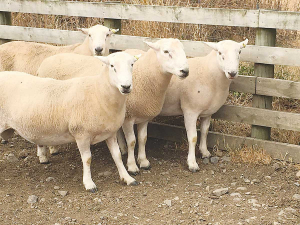Getting sheep shape at Pyramid Farm
The vineyards at Pyramid Farm in Marlborough’s Avon Valley have never been run of the mill, with plantings that follow the natural contours of the land, 250 metres above sea level.
 A Massey University study is looking at the production consequences of crossbreeding with Wiltshire sheep to a fully shedding flock.
A Massey University study is looking at the production consequences of crossbreeding with Wiltshire sheep to a fully shedding flock.
Massey University is examining the economic impact and the production consequences of crossbreeding with Wiltshire sheep to a fully shedding flock.
Coarse wool sheep farmers are struggling with the cost of shearing in relation to the value of the wool clip. Many are considering if changing to a self-shedding flock, such as a Wiltshire, is a better way forward.
However, the cost of purchasing purebred Wiltshires – and the limited numbers available – means this is not a viable option for many. However, there are examples of farmers successfully grading up to Wiltshires by continual crossing. But there is a general lack of accurate recorded information on the costs, benefit and pitfalls from doing so.
Massey University’s sheep team, led by Professor Steve Morris, has begun a long-term study to address this lack of information. The project has two aspects: Firstly, to model the profitability over time of such a change; Secondly to undertake a multi-year study recording animal production and performance, as a flock is graded up from Romney to Wiltshire.
The long-term, multi-year study will also help identify and quantify any issues as they arise. It will also identify which crossbred ewe lambs are the best to select from a shedding perspective and provide further information to improve the economic model.
Having an interested farmer group will also be an integral aspect of this project.
The project, which started in March 2020, with 400 Romney ewes bred to Wiltshire rams and a comparable group of ewes bred to Romney rams. The project is being undertaken at Massey University’s Riverside farm, 10km north of Masterton.
Lambing was due to start on 17 August and all lambs will have birth, weaning weights and growth rates to weaning recorded. The Wiltshire cross lambs will be given a shedding score on a scale 1 (no shedding) to 5 (fully shed) – after weaning in January and February 2021.
Ewe lambs from this first crop will be bred to Wiltshire rams in April 2021 to generate three quarter (F2) Wiltshire lambs in August 2021. Then the study continues with 7/8s or F3 Wiltshire lambs born in 2022 and 15/16s (F4) born in 2023.
At each lambing, the lambs and their performance will be compared to the base Romney flock at Riverside farm. Other traits to be investigated throughout the grading-up process will include potential health issues such as internal parasite status, feet, teeth, FE.
Animal behaviour measurements will also be done as some farmers have commented that the Wiltshire is a different animal to manage.
The shedding score will be an important underpinning variable to identify which crossbreeds are best to select to ensure quick progress through to a fully shedding flock. Shearing requirements of the various crossbreds will also be recorded.
Massey is planning to hold an open field day in early 2021.
Meanwhile, the project team are interested to hear from any farmers who currently have Wiltshire sheep on their farms.
• Contact This email address is being protected from spambots. You need JavaScript enabled to view it.
Dairy Women's Network (DWN) has announced that Taranaki dairy farmer Nicola Bryant will join its Trust Board as an Associate Trustee.
Rural Women New Zealand (RWNZ) says it welcomes the release of a new report into pay equity.
Red meat exports to key quota markets enjoyed $1.4 billion in tariff savings in the 2024-25 financial year.
Remediation NZ (RNZ) has been fined more than $71,000 for discharging offensive odours described by neighbours as smelling like ‘faecal and pig effluent’ from its compositing site near Uruti in North Taranaki.
Two kiwifruit orchards in the Bay of Plenty and one in Northland are this year's finalists for the Ahuwhenua Trophy competition.
The Government's chief science advisor, Dr John Roche says the key objective for the science sector in the coming year is bedding down the reforms which sees the merger of the previous entities.

OPINION: A mate of yours truly reckons rural Manawatu families are the latest to suffer under what he calls the…
OPINION: If old Winston Peters thinks building trade relations with new nations, such as India, isn't a necessary investment in…